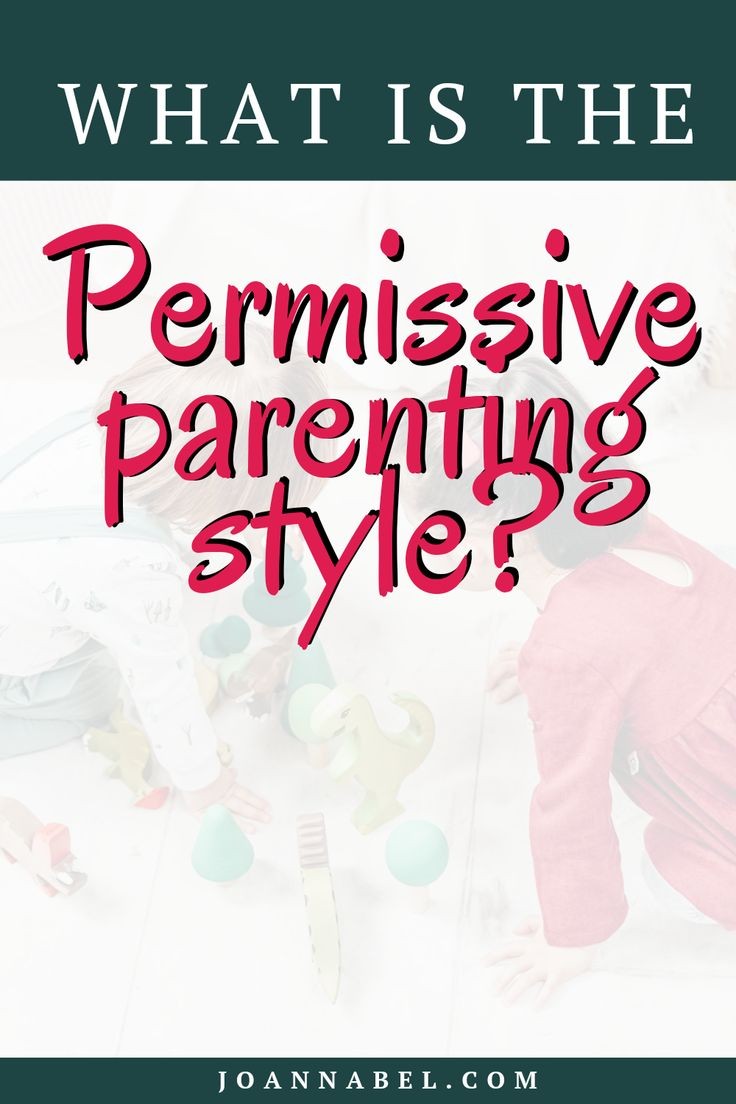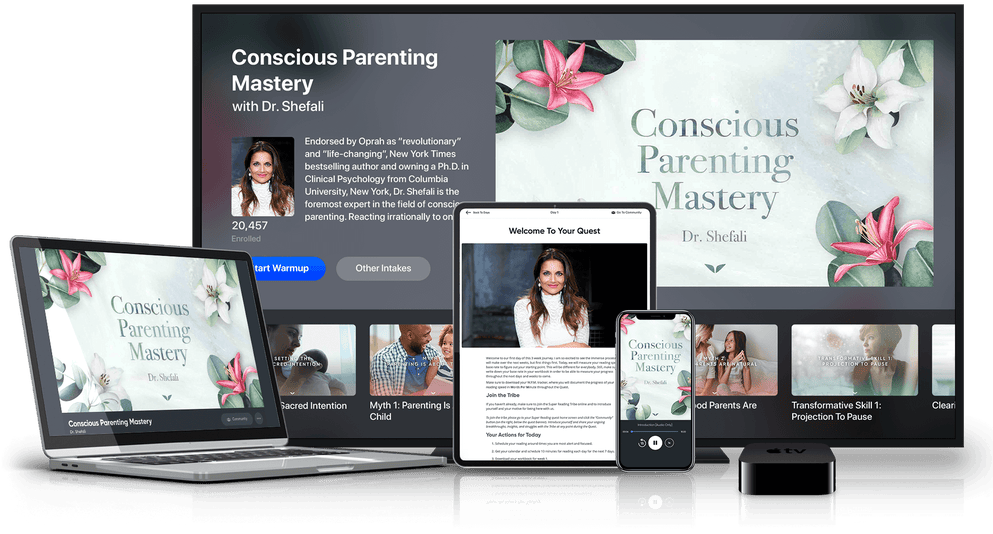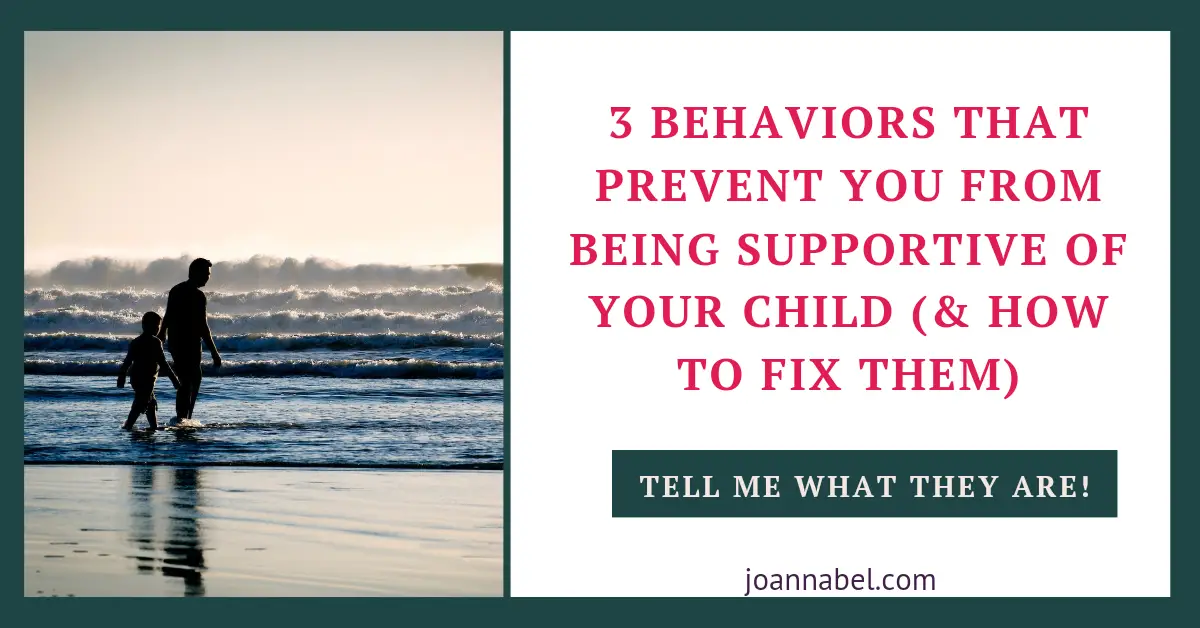If you wonder whether your parenting style is a Permissive parenting style, this post is very likely to clear out your doubts about it.

The permissive parenting style is a style of parenting recognisable by close and (too) connected (enmeshed) relationships and a highly protective approach to parenting, with nurturing too much flexibility that results in disregarding the child’s need for discipline, structure, and clear and consistent behavioral expectations and rules.
And this post we’ll talk about:
- What the permissive parenting style is in more detail
- How was permissive parenting discovered, when it was investigated, and by who
- What the effects of this parenting style on child development and child behavior are
- The difference between permissive parenting and strict parenting
- The difference between permissive parenting and authoritative parenting
- The difference between permissive parenting and neglectful parenting
- What the signs of permissive parenting are
- ”Fixing” permissive parenting
And more! I’ll also mention what to consider doing if you feel like your parenting style is not working for you very well.
Let’s jump right in!
Note: Even though I am a licensed clinical social worker (LCSW), I am not your licensed clinical social worker (LCSW). This means engaging with our website is not considered a professional social worker and client relationship. This also means you should not consider this information as professional advice. Although we do put in every reasonable effort to provide the most accurate and reliable information, this does not replace professional advice, and you should not rely only on them. You still might need to consult a professional to introduce your particular situation, issue, problem, or position. Read our full Disclaimer here.
WHAT IS THE PERMISSIVE PARENTING STYLE?
The permissive parenting style is known in modern social science theories and practices, as well as in public discourse, as a parenting style in which parents nurture a close and (too) connected (enmeshed) relationship with a child and have a highly protective approach to parenting, but disregard the child’s need for discipline, structure, and clear expectations, keeping them low by remaining too flexible with the child’s desires, wants, and expectations for their behavior.
David Olson’s Circumplex Model of Marital and Family System describes the permissive parenting style as a style with high chaos (too much flexibility) and high enmeshment (too connected).
This model is one of the most widely used models for describing and inspecting the patterns of family functioning.
As the permissive style becomes more extreme and far-off, the family moves to the style this model determines as the “chaotic enmeshed” style.
That’s highly problematic for parenting to be effective.
The reason for this is continual change, lack of stability, and coerced togetherness that is unhealthy for the family system.
If you want to understand more about the Olson’s model and how it inspects parenting styles, read it in my post that covers all 5 parenting styles. Here is the link to it.
But if you’re confused about what parenting styles are in the first place, let’s quickly take care of this first.
WHAT DOES A PARENTING STYLE MEAN?
Parenting style refers to the consistent and stable patterns of demands, structure, and responsiveness that parents cultivate in all of their interpersonal interactions with their children. The parents’ practices are dependent on these patterns. That’s why it’s called style – it is perpetual and it’s resistant to events, situations, a child’s age, and developmental phase. This doesn’t mean that it’s unchangeable, it only means that it is constant.
If you need to know more about the 5 parenting styles, I got you – read my post that explores them in great detail: What Are The 5 Parenting Styles: All You Wanted To Know.
PERMISSIVE PARENTING STYLE LONGITUDINAL STUDY
The permissive parenting style was first discovered and described by the deceased Diana Baumrind, a developmental psychologist with a Ph.D. in psychology at the Institute of Human Development, University of California, Berkeley, who is now recognized internationally as a pioneer of research on parenting styles.
She discovered the permissive parenting style together with two other parenting styles in her groundbreaking research on prototypes of parenting styles, well known as ”Baumrind’s parenting typology”.
Recommended Parenting Resource for You
Baumrind did it on the basis of home observations, laboratory observations, and interviewing the parents. She studied parenting styles in a longitudinal study of parents, which began in the early 1970s. The psychologist followed families with preschoolers to their late adolescence.
Also, she was one of the first to include both mothers and fathers.
Let’s see what she discovered.
WHAT ARE THE THREE PARENTING STYLES ACCORDING TO BAUMRIND?
Diana Baumrind identified and described three styles of parenting associated with 3 patterns of child behavior. The styles were:
- Authoritarian,
- Authoritative (democratic), and
- Permissive (laissez-faire) parenting style.
While the 3 patterns of child behavior were:
1. Pattern A – Assertive, self-reliant, self-controlled, buoyant (cheerful, optimistic), and affiliative.
2. Pattern B – Discontented, withdrawn, and distrustful.
3. Pattern C – Little self-control or self-reliance, and retreat from innovations.
The pattern A was associated with an authoritative parenting style.
Pattern B with authoritarian parenting style.
And pattern C with a permissive parenting style.
PERMISSIVE PARENTING STYLE RESEARCH
Baumrind’s results regarding parenting styles research have influenced and have been replicated in hundreds of studies, and her findings are authenticated.
So, since Baumrind had guided her groundbreaking investigation in the 60s/70s, there was a great deal of research with a focus on the relationship between the parenting styles she had identified. As well as on the outcomes they produce in children.
Many authors continued to build upon her findings.
Maccoby and Martin confirmed the 3 styles and described the 4th parenting style besides the 3 called the uninvolved parenting style. This style is pretty similar to the rejecting-neglecting style that Baumrind’s 3rd study of preschoolers found.
Recommended Parenting Resource for You
David Olson’s Circumplex Model of Marital and Family Systems (the Circumplex comes from the expression “circular order of complexity”) model introduced 5 parenting styles. It is one of the most widely used models for inspecting and describing the patterns of family functioning.
This model inspects how balanced (how healthy is the family functioning) is the family system evaluated through 3 dimensions (cohesion, flexibility, communication), where the permissive parenting pertains to unbalanced systems.
A balanced system is the system in which there is balanced cohesion, communication, and flexibility, while in an unbalanced system this is not the case.
More details about the model and the 5 parenting styles the model presented, read in my post about 5 parenting styles. Go here: What Are The 5 Parenting Styles: All You Wanted To Know.
Recommended Parenting Resource for You
LIVE Q&A And Consultations with Jovana (WISHLIST)
Want a chance to get included in live weekly calls with me and get access to my expert insights, advice, recommendations, and guidance for your unique situation?
Consider signing up if you are aiming for:
- achieving tremendous child-parent relationships with the least effort possible as you learn what to focus your attention to
- attuning to healthy child development practices without losing yourself in the process and ignoring your human needs, rights, and aspirations for your life
- understanding and responding to your and your child’s needs better and carefully easing the tension between the two
- having your most pressing questions and concerns addressed and ongoing support
- getting skilled in honoring the child’s best interest in each life situation with the help of a few key rules and principles (child wellbeing, independence, autonomy, participation, and equality)
- experiencing a supportive and cooperative relationship with the other parent or a co-parent even in high-conflict circumstances
Address your doubts, concerns, and challenges, but also reflect on your situation through the experiences of others in this small and supportive community.
You’ll unlock monthly access for 60% off of my current hourly rate!
PERMISSIVE PARENTING STYLE DIANA BAUMRIND DESCRIBED
Baumrind describes “laissez-faire” or permissive parenting style as a combination of high emotional warmth and low structure and demandingness.
So this meant that permissive parents are emotionally warm and responsive to their children in their interactions but are not providing enough guidance, structure, or appropriate demands for maturity.
She defined the characteristics of a permissive parent as: low control, high focus on a child (child-centric), high emotional warmth and responsiveness.
If you want to know more about emotional warmth and responsiveness and what it is in your parenting capacity, read my post that cover it. Here is the link: What Is Emotional Warmth In Parenting Capacity?.
WHAT ARE THE CHARACTERISTICS OF A PERMISSIVE PARENT AND PERMISSIVE PARENTS’ BEHAVIOR?
Permissive parents will be too affirmative towards the child’s preferences and let them prevail over their standards.
They will rarely pressure the child to conform to their standard, which puts children in an unsettling position because children are not yet ready to guide themselves.
These parents aren’t confrontational enough or they avoid confrontation, which leads to children lacking boundaries because they can pretty easily manipulate rules.
This parent tends to have a friendship with the child instead of stepping into the role of a figure responsible to shape, model, and direct the behavior.

What can create confusion in understanding whether parenting is permissive is the fact that we could be talking about different things and calling them the same when we explain the behavior of permissive parents, or we could be talking about the same quality but not be aware of it.
Let’s break this down.
We may understand that unless you’re imposing rules or punishing, you’re not being an authoritative parent, and you’re therefore a permissive one.
But the Circumplex model clearly states that the family will pertain to democratic (authoritative) style if they are somewhat flexible to very flexible (and somewhat close to very close), but they won’t be inflexible and too flexible (and they won’t be disengaged or too close).
This means that if they are at “the extremes”, then they belong to another parenting style. (Read about other parenting styles here.)
So you can create enough structure for your kids even if you aren’t strict with them, but rather teaching them how to understand some principles that will tell them what’s appropriate behavior.
Recommended Parenting Resource for You
This means, for example, that both you and I can be authoritative parents, even though one of us relies more heavily on rules and structure, while the other one doesn’t.
But if we both accept the role of a parent, ready to model and shape socially acceptable behavior and recognize behavior that’s antisocial, and are ready to take action, disciplinary measures, and control over the situation so we can help a child improve and learn, we can both be defined as authoritative parents.
So it’s not about authoritative parents behaving exactly the same; it’s about whether we are effective as parents or not. Being permissive shouldn’t be understood as a “bad” quality because flexibility cannot come without (a little or a lot of) permissiveness.
For instance, we permit others to approach us, right?
We permit kids to ask questions, negotiate, and oppose our perspective when we’re democratic (authoritative) parents. But we don’t permit our kids to punch or bully other kids, punch us, steal, manipulate others, etc.
You now see how we could be talking about the same parenting style without realizing it.
Learn more about authoritative parenting here, this is my blog post about it.
PERMISSIVE PARENTING VS. AUTHORITATIVE PARENTING
Let’s compare permissive parenting with authoritative parenting. The authoritative parenting style is a composite of emotional warmth and responsiveness, but with the existing structure, boundaries, and limits put in place, and with parents empowering the children to do their best.
I have 3 different posts that cover these 3 aspects in more detail. Here are the links:
- What Is Emotional Warmth In Parenting Capacity?
- Guidance And Boundaries In Parenting Capacity
- How To Help Your Child Reach Their Full Potential: 7 Positive Parenting Rules
Baumrind called authoritative parenting effective parenting because she had discovered that it works very well!
In the Circumplex model’s Authoritative (Democratic) parenting style is the balanced type among the other 4 types. The families that fall under the democratic spectrum range from somewhat connected to very connected (for the cohesion dimension – togetherness).
And they vary from somewhat flexible to very flexible (when it comes to the flexibility dimension).
The family is more functional as the levels of balanced cohesion and balanced flexibility are higher.
So, as opposed to permissive parenting, authoritative parents, do take responsibility for being the ones in charge of shaping and directing the behavior.
To learn more about this parenting style read my post that explores it in much more detail. Here is the link to it.
You may also be interested to read the post that explores the difference between authoritairan and authoritative parenting style:
Read also:
PERMISSIVE PARENTING VS. NEGLECTFUL (UNINVOLVED) PARENTING
Let’s compare permissive parenting and neglectful parenting.
When we talk about neglectful parenting, we’re talking about the Uninvolved parenting style.
The Circumplex Model describes the Uninvolved style of parenting as a style characterized by high levels of chaos (too flexible) and disengagement (disconnected).
With uninvolved parenting, children are ignored, and their choices prevail over their parents’ unless these activities get in the way of the parents’ activities.
As the uninvolved style becomes more extreme, it moves toward the “chaotic disengaged” pattern.
This is so difficult for children, considering they’re on their own without emotional support and a lack of consistent rules and expectations.
As you can see, the Uninvolved parenting style is characterized by chaos like the permissive style, but as opposed to the permissive style, the relationships are not close but disengaged. For more details about the uninvolved arenting style, read my post dedicated to it. Follow this link.
PERMISSIVE PARENTING VS STRICT PARENTING
Now let’s see how permissive parenting is different from strict parenting. In Baumrind’s typology, what can be considered strict parenting is Authoritarian parenting because these parents set high demands on their children’s behavior in a cold, rigid, even harsh manner while lacking emotional warmth and responsiveness.
Permissive style is the opposite, with parents who are emotionally warm and responsive to their children, but disregard or overlook providing enough guidance, structure, or appropriate demands for maturity.
And just to compare this to the authoritarian style in Olson’s model, – in Olson’s model, the authoritarian parenting style is characterized by high rigidity (inflexibility when it comes to rules and discipline) and high enmeshment (too much cohesion/closeness of relationships).
You can learn more about the authoritarian parenting style in my post that explores its characteristics and effects on the family and children. Follow this link.
When it comes to the Strict style (or Rejecting parenting style) in Olson’s model, it is described as a style too low on closeness while not being flexible enough (inflexible). (You can read about the rejecting style in my post that covers it in more detail. Follow the link.)
Here, the parents are imposing very strict rules and harsh discipline and are restricting freedom while being very disconnected emotionally from the child.
If you found the information on the blog helpful & inspirational and you feel like giving back, you can do it by clicking the donate button after entering amount you’re comfortable with. I’ll use it to create and deliver more useful content and resources like this. Thanks for your precious contribution!

WHAT IS AN OVERLY PERMISSIVE PARENTING STYLE?
When it comes to overly permissive parenting, the Circumplex model describes how, as the permissive style grows even more extreme and far-off, the family moves to the “chaotic enmeshed” style.
This means that the structure becomes even more flexible which raises the level of chaos and/or the demands for closeness get higher.
That’s highly problematic for parenting to be effective.
The reason for it is:
- continual change and lack of stability, and
- coerced togetherness that is unhealthy for children and the family system in general.
WHAT IF YOUR PARENTING STYLE ISN’T WORKING WELL FOR YOU?
If you find that your parenting isn’t working then I want to recommend a program called Conscious Parenting Mastery, creates by well-known parenting expert Dr. Shefali hosted on Mindvalley.

Dr. Shefali’s program is an amazing 35-day program you can consume at your pace, created by Dr. Shefali, an experienced psychologist who works with families and creates courses and programs to help parents resolve problems in their relationship with their children through connection with them.
It is one of rare programs that can transform the relationship with your child.
will equip you with everything you need to become a parent who is able to raise kids who are:
- Well-adjusted
- Authentic
- Healthy
- Confident
- Ambitious
- Cherful.
You can become a proud parent you truly desire to be and experience true connection with your kids and a peace of mind because you’re giving them your best and are certain that you’re headed towards the brighter future for both of you.
Her proven framework will empower you to a step into a fully refreshed parenting role with more confidence and certainty that what you’re doing is what both you and your kids need.
Plus, you should know that you don’t need to worry if you partner, the other parent doesn’t follow you right now, because you will see change anyway and you’ll positively influence them as well.
Mindvalley is an amazing platform created to level up your life by embracing personal growth and anyone can find programs that will fit their individual needs depending on the area of life they find troubling, too challenging, or simply want to improve to serve them best.
And if you decide to join the membership, you will get a chance to get the full Conscious Parenting Mastery program alongside over 100 other programs (and counting because each month a new program -Quest is added to the platform) for a single monthly price.
You can go from confused, overwhelmed, and without a clear vision for your life, to confident, grounded and focused, as well as determined about how you want your life to be, by focusing on personal growth and Mindvalley will give you this chance. Make this year the year you get to the next level.
What you can expect once you begin engaging with this platform is:
- true self-discovery so that you can start identifying your real preferences, aspirations, goals, and dreams
- setting meaningful goals that have the potential to fulfill your need for self-actualization as opposed to only living on someone else’s terms and building someone else’s dream in order to be accepted by the environment and perceived as successful
- liberation from fabricated societal expectation and norms that not only don’t serve you, but are in fact representing oppression which is suffocating your soul that only wants you to live in alignment with whom you truly are and not what society expects you to be
- to finally awaken your authenticity by letting yourself be visible as opposed to being shy or ashamed of who you are deep down or what you want behind the closed doors
- to acquire skills to make life decisions aligned with your core values and true desires coming from the depth of your being
- begin stepping into your potential and move towards reaching full potential unique for you and different from anyone else’s in the world
- become skilled at self-love that holds the key to building the life of your dreams
- finally become comfortable in your own skin, doing your own thing, and going where you truly want to go in life
- build the life you are proud to call your own and experience lasting fulfilment because your consciousness is so expanded that you don’t need to worry about whether things will work out for you ever again, as now you have skills and support to make them work
- healthy and vibrant mind, body, soul, and relationships, considering that the platform delves deep into all these topics and areas of life.
And you’ll have access to the community of like-minded folks to connect with to whom we can relate. Right now you can enjoy the membership at a special price, so if you were thinking about expanding your self-growth so you can reach your full potential, there’s no better time than now.
If you want to dive deeper into this platform, read my post that mentions more than 30 programs you can expect to find on the platform if you decide to get inside the membership: 30+ Transformational Online Personal Development Programs For Creating The Life You Desire.
Now that I’m done with this short interupton, we can move on to see how permissive parenting influences children.
HOW PERMISSIVE PARENTING AFFECTS CHILD DEVELOPMENT AND WHAT ARE EFFECTS OF PERMISSIVE PARENTING ON CHILD BEHAVIOR?
When it comes to how permissive parenting affects children, it is discovered that permissive parenting is associated with kids’:
- low(er) self-esteem,
- impulsivity,
- excessive aggression,
- poor self-control
- low self-reliance,
- lacking boundaries because they can easily manipulate rules,
- retreat from innovations,
- low achievement.
Children of permissive-style parents exhibit impulsive-aggressive behavior in general, and often are domineering and rebellious since they have problems accepting any authority.
This is not unexpected considering their permissive parents avoid (or do it rarely) setting expectations, providing structure, or implementing disciplinary measures when a child’s behavior turns inappropriate or anti-social.
Recommended Parenting Resource for You
Considering authority is very conflicting to these children, they may be underachieving because of their problem with authority and not because they necessarily lack intellectual capacity.
However, they may start lacking the skills to participate over time because their behavior and lack of self-discipline and self-control become detrimental to the opportunity to make progress in the academic environment.
In my professional practice I’ve seen children drop down to the mild intellectual disability solely because of upbringing negligence. At the same time I’ve seen that a child with mild intellectual disability flourishes because of exceptional support and upbringing, so they leveled up to regular intelligence coefficient.
PERMISSIVE PARENTING STYLE AND ACADEMIC PERFORMANCE
Data from multiple investigations has shown us that authoritarian, permissive, and neglectful parenting styles are brought into connection with lower academic performance. While authoritative parenting style has been consistently related to better academic achievement and accomplishments.
This positions an authoritative parenting style as outperforming compared to the other 4 because it proves itself as more effective for greater academic accomplishments than a too permissive, too strict, or too restrictive approach or neglection.
But this must be taken with a grain of salt, because culture will play a role in how tolerant children and families are regarding permissiveness and authoritarianism.
Children can become achievers in cultures where the society attributes a positive connotation to permissiveness or strictness more than this is the case in the Western cultural climate.
What’s important here is a child’s perception and intimate(personal) sensations and feelings about how parents treat them. So if a society in which a family lives values authoritarianism more, they can have children thriving academically because more strictness is perceived as a positive thing, more like a training and more supportive than it would be seen in a different society that nurtures a different culture.
Even Baumrind uncovered this in her research, when she found out that African-American girls from low-income families in the US were very responsive to their authoritarian parents and were showing signs of great resilience, assertiveness, and independence.
Recommended Parenting Resource for You
As cultures touch each other and, considering Western culture keeps expanding, more and more people have taken on the values of the western population, but that doesn’t necessarily mean that everyone has to raise children that way.
I believe we should borrow good things from some cultures, but raising kids and parenting doesn’t need to be universal, and it really isn’t. It’s better to be more open-minded about the other culture’s values, customs, circumstances, and competence and learn from one another.
For example, if our society values togetherness and solidarity, we may be less sensitive about very close relationships, or if it favors individuality, we may feel restraints because of these relationships.
It doesn’t matter what we call the style if it is nurturing and respectful towards children and provides guidance, because this will support them in growing into responsible, resilient, and autonomous adults.
This is why authoritative parenting usually outperforms the rest. Read about 10 benefits of authoritative parenting.
SIGNS OF PERMISSIVE PARENTING
Let’s see how to recognize if you’re showing signs of permissive parenting.
So to understand if your parenting is permissive, ask yourself:
- Has my parenting been effective so far?
- How do my kids behave, and is their behavior prosocial?
- Are my kids in constant conflict with authority figures or never accepting of authority figures?
- What’s happening with their accomplishments at school?
- Are they disengaged in school environment because they can’t accept authority or because they lack the ability to learn?
- What do I think about discipline (which doesn’t equal punishment)? Am I ready to put disciplinary measures into action to address the unacceptable behavior? Do I follow through once a disciplinary measure is in effect?
- How supportive am I when it’s time to learn prosocial interaction?
- How do I feel in the role of a parent? Am I simply acting friendly with my kids, or am I trying to be their friend at the cost of not being a figure that shapes their behavior?
If you find that you fit all or most of the descriptions above, you should put effort into changing how you parent, because you’re probably more permissive than this it’s useful for your kids and you.
“FIXING“ PERMISSIVE PARENTING (HOW TO STOP BEING A PERMISSIVE PARENT?)
Here are a few tips to get you started moving towards a less permissive parenting style:
- get more comfortable with setting clear and firmer boundaries
- set clear expectations for your child’s behavior (and honor them yourself) and support a child in attuning to your standards, but always avoid force, especially an excessive one
- explain your rules and expectations but avoid overexplaining and overjustification (stay assertive)
- assess your level of protectiveness towards your child so that you can uncover if you are doing things on their behalf and therefore compromizing expansion of their independence
- avoid doing things which are your child’s responsibility as well as all things that a child can already do for themselve or by themselves
- give your child enough time to adjust to the new atmosphere and conditions that will occur once you start changing your parenting style to a less permissive one
- estimate the familiy members’ closeness level and allow more personal space, autonomy, and independence for your child if you see clearly that relationships are too cohesive
- if a child shows signs of maladjusted or antisocial behavior, don’t wait too long before asking for support
Instead of continuing to behave as you did before, it’s time to step into the role of a parent who is there to guide and manage the behavior and start approaching things differently.
As you can see becoming more authoritative is proven to work, but if you want to see more benefits of this parenting style, read my post that explains the benefits of Authoritative parenting: 10 Benefits Of Authoritative Parenting: For Parents And Kids
Changing a parenting style comes with awareness first. You need to be open to finding out if permissive parenting style is indeed your style.
If you find that it is, you can choose to do something about it once you acknowledge and accept that it’s no longer in your or your child’s best interest to continue down the same route.
Recommended Parenting Resource for You
You will be tempted to do things in the same way you used to, but this shouldn’t discourage you because this is common and expected. So instead of believing nothing will change and you can’t change because you’re tempted to go back to the old ways, you should acknowledge that this is just a part of the process of change.
Once you’re more aware of what you are doing, you get a chance to do things differently, so anytime you are about to respond to the situation in front of you, stop for a second to think: Am I about to respond in the old way or the new and better way?
It’ll get easier if you stay persistent despite being uncomfortable, doubting your abilities, or not seeing results immediately.
Let me know what you think about this. Leave a comment below.
Latest Posts:
- Top 17 Tools For Personal Development For Growth and Success

- The Best Personal Development Resources (14) From Which You Can Immediately Start Benefiting

- Self-improvement Products: 18 Things To Buy And Unlock Your Potential

- Best Things To Buy To Make You Feel Better (Feel-Good Purchases)

- 20 Meaningful Gifts For Someone Going Through A Hard Time

- 17 Gifts For A Man Going Through A Hard Time-Brighten The Dark Days

CONCLUSION AND PARTING WORDS
We can conclude that even though you want to be permissive with your parenting, this doesn’t mean you should free yourself of your responsibility to guide your child, model socially acceptable behavior, direct the behavior, help a child overcome anti-social tendencies, etc.
This means that you can “choose” your level of strictness as long as you’re within the democratic parenting spectrum – as long as your parenting is flexible enough and responsive enough you should obsess over rules, limitations, and directivity.
If more permissiveness (looser rules and structure) or more authoritarianism(more rules/structure) works well for your kids (in your culture) you don’t need to change things that are working because you see that your kids are well-adjusted and thriving.
But it’s important to be open to seeing or hearing more about whether things are really working that well as we believe or want to believe, as well.
I hope you found this post helpful! Thanks for sticking with me and I’ll see you in the next post! Here is one:











Leave a Reply